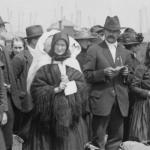
In a previous post, I asked if Robin Hood was a hero or a criminal. The fact is that we all believe he is a hero—even if we don’t approve of his methods.
At the same time, I do not doubt that some Christians might argue that Robin Hood was a criminal. After all, he was a thief. Therefore, one may argue that Robin Hood and Jesus (he worked on the Sabbath) were lawbreakers.
It is my conviction, however, that this understanding, though seemingly rooted in a consistent application of the law, derives from a failure to grasp the very purpose of the biblical law.
NB: Ironically, in fact, I would note that those who would aim to condemn Robin Hood are on the same side of the debate as the Pharisees were in their condemnation of Jesus. (See, for example, my previous post, where I address the disciple’s eating of grain on the Sabbath; Mark 2:23-28)
Laws were meant to protect the poor and the marginalized
A proper understanding of the Law begins by recognizing that the Laws were meant to protect the poor and the marginalized from being exploited by those in power.
If you think about it, kings and those in power have plenty of ways to ensure that justice is achieved if they are ever wronged. They didn’t need a civil law code to protect their rights.
The poor and the marginalized, however, needed laws to protect them from being exploited by those in power.
Enter King David. He commits adultery with Bathsheba and follows this up by killing her husband Uriah (see 2 Sam 11-12).
Or consider the story of Naboth (1 Kings 21). King Ahab wants his land but Naboth, a faithful Israelite knows that God does not permit the selling of ancestral lands, does not want to part with it. So Ahab, through the scheming of his wife Jezebel, acquires the land by killing Naboth.
The fact is that even though the Israelites had laws in place to protect people like Uriah and Naboth, those in power were still able to abuse their power and get what they wanted.
Note that even laws in place that were designed to protect them, the poor and the marginalized have little recourse to justice because justice is often dispensed by those in power.
What does it mean to Honor your father and mother?
A few posts ago, I asked if an abused child was required to “honor their father and their mother”?
Once again, those who advocate for a strict understanding of the law, fail to grasp the purpose of the Law. In this case, they also misunderstand the meaning of the law.
Interestingly, if we were to ask the average person on the street if an abused child must obey their abusive parents, they would certainly answer with a resounding “No.” Most certainly therapists and members of the criminal justice system would also denounce any suggestion that a child had to “honor” such a parent. In fact, they would be far more likely to demand that the child be protected from abusive parents.
Yet, sadly, Christians who have this overhanging sense that the 10 Commandments require the child to “honor” their parents are not so quick to agree. They don’t agree, however, because they have a gross misunderstanding of the purpose of the Law—to protect the poor and marginalized—and they fail to understand the specific intent of the command to honor one’s parents.
The command to honor one’s parents has little to no application to young children. The command has everything to do with grown children taking care of their aged parents. After all, it is aged parents, who can no longer work and provide for themselves, who are in danger of becoming the poor and the marginalized.
Jesus raises the dead not for the dead’s sake but for his mother’s sake
Read carefully the story of Jesus raising a young man from the dead in Luke 7:11-17. Luke shows little interest in the young man. Instead, the miracle focuses on the mother. Luke tells us, “dead man was being carried out, the only son of his mother, and she was a widow” (Luke 7:12). This woman is the epitome of the poor. She has no husband (widow) and no son to care for her.
Luke notes, “When the Lord saw her, He felt compassion for her” (Luke 7:13). Jesus does not raise the young man for his sake but for the sake of the mother: “The dead man sat up and began to speak. And Jesus gave him back to his mother” (Luke 7:15).
This son was needed so that he could “honor his mother” lest she become the poor and the marginalized.
Jesus chastises the religious leaders for dishonoring their parents
In Mark 7:1-13, the religious leaders attempt to confront Jesus again. This time they ask why His disciples were eating with “unclean” or “impure” hands (Mark 7:5)—referring to ceremonial cleaning.
Jesus responds by chastising them as those who “are experts at setting aside the commandment of God in order to keep your tradition” (Mark 7:9). Jesus then cites the 10 commandments and contends that they have failed to honor their father and mother (Mark 7:10-14).
What Jesus was exposing is the fact that the religious leaders had created a system by which money/property, which was supposed to be reserved for caring for one’s parents in old age, was instead, “dedicated to God” (i.e., “Corban”). Although giving money to God might sound like a “spiritual” act, it was designed to line the pockets of those in power and to circumvent one’s obligations to “Honor your father and mother.”
Jesus’ confrontation with the religious leaders illustrates an understanding of the command to “honor your father and your mother” that is quite different from how this command is understood in most churches today.
Jesus did not understand the command in terms of how a young child must submit to their parents—thus creating the quandary of whether or not a child must “honor” an abusive parent. Instead, Jesus’ accusation regarding their setting aside the commandment to honor one’s father and mother shows that He applied the commandment to adult children and their responsibility to care for aging parents.
The law was meant to protect the poor and the marginalized and aging parents could easily fall into such categories if their children do not “honor” them.
The Banking system’s abusive credit card practices
In my last post, I briefly commented on the banking industry’s practices of charging excessive interest rates. I suspect that very few of you were overly irritated by what I noted. However, I wish that you were infuriated.
After all, just as the story of Robin Hood is intended to illicit anger at the abusive practices of those in power, who gained their wealth at the expense of the poor, so our society today is doing the same thing.
In my next post, I’ll explain why this is important and how it relates to the present discussion. . . .
Our goal is to keep these posts free of charge. I do not intend to ever hide them behind a paywall. I can only do this if those of you who have been blessed by them and can afford to give ($5, $10, $25, or more/month) do so. You can give a tax-deductible contribution by following this link.
Please share this post and let others know about determinetruth.
If you wish to view this blog on your smartphone through the Determinetruth app simply download the “tithe.ly church” app on your smartphone and insert “determinetruth” as the church name you wish to follow. Once it is loaded, simply click on the “blog” icon and it will automatically load.
If you would like to have Rob speak at your church or organization in person or via Zoom, please let us know by filling out the contact info on the Contact me tab on this site.













